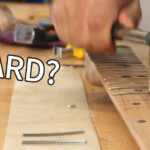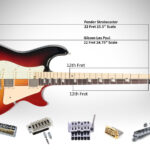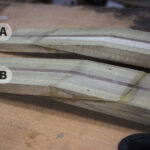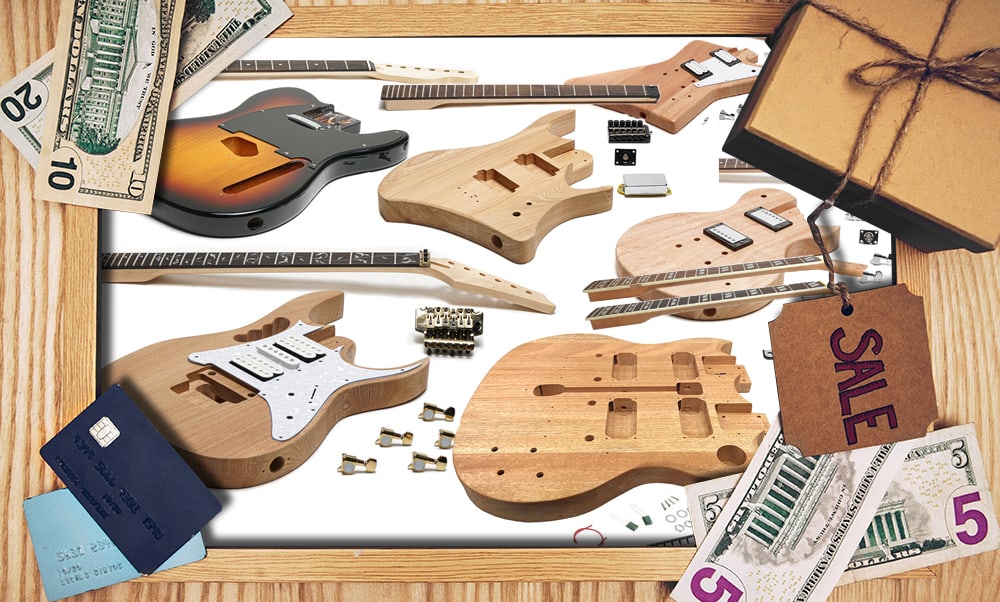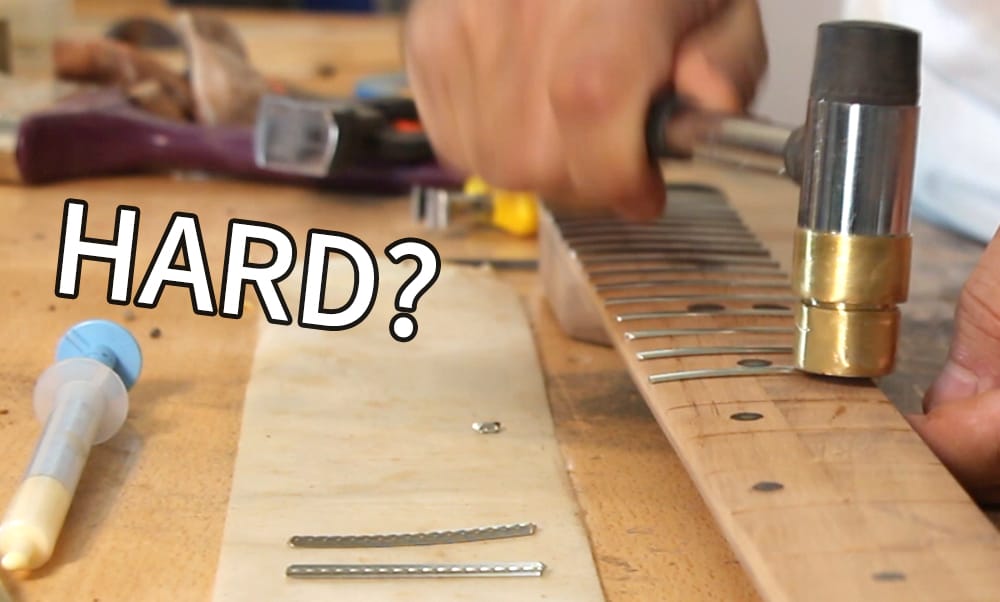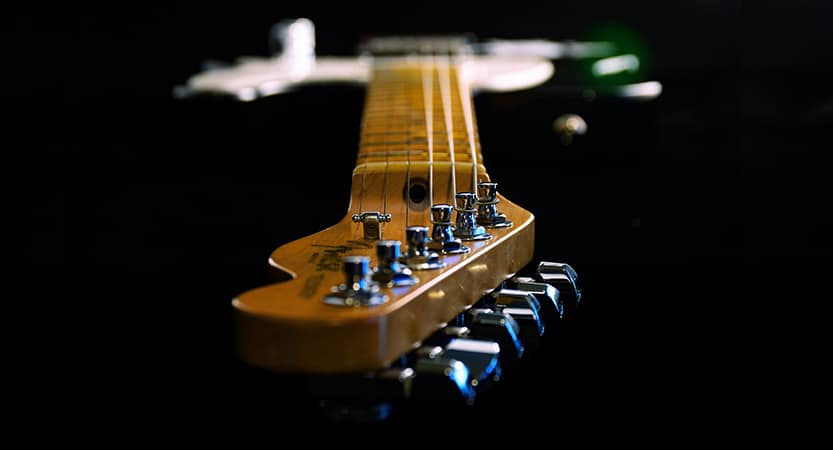The premises of a guitar kit seem very appealing to DIY enthusiasts, many guitar players and couples of the above thinking of a present. For some, this may be a stepping stone to building more guitars or maybe even a ‘scratch build’, and for others, it’s a one-time project. There are multiple websites dedicated to selling these kits and of course many on Amazon and Chinese websites, where most of them are made. They start at around 120$ and will go up to 250$ with some models like double-necks going up to about 350$
But are they worth it?
I will have to go with a big YES. Before you say I am bias (yes, I am) there are quite a few reasons why I would say that.
- It’s good value for money
- Requires minimal knowledge and minimal tools
- Wouldn’t be much more than a weekend project, for most
- You will end up with a legit guitar
- You can make it a unique guitar
- If you are a player, this can be a great base for upgrading and experimenting with hardware
This all sounds great but to get the full picture we’ll need to expand on that. Let’s dive deep into what makes a guitar kit what it is, and if it’s a good match for you at all.
How good are DIY guitar kits?
Guitar kits are OK. If you compare a kit guitar to a guitar that will cost over 1000$ in the store, it will obviously be inferior, in pretty much any aspect you will judge it. Comparing your creation to a guitar that costs about the same amount as the kit itself, may give you more favorable results. The reason cheap guitars are cheap is not just the lower labor costs in the countries in which they were made. They are cheap because they have cheaper parts, with cheaper materials and because the relatively cheap labor is not given the time to give the attention given to high-end guitars. The reason a kit guitar is, relatively cheap is exactly the same. That doesn’t mean they can’t make a nice guitar out of a kit, you can make a great guitar; It just means that even if you do a fantastic job and give all the extra time and attention, you will not exceed the quality of guitars which may cost over 500$-600$, and I am being generous.
What do the kits include?
A guitar kit will include all the hardware you would need for the specific type of guitar. That will include the machine heads (tuners), the pickups, the bridge, the pickguard (if applicable), and all the screws, strap buttons, and necessary covers. It will also include all the electric components, such as potentiometers, capacitors, switches, knobs, and wires. The body will usually come cut, routed, and unfinished, although there are more and more finished kits being offered. The neck will come fully fretted, with a nut, and also unfinished as far as to paint or oil. Some kits will also have a solderless option so that all the electric components can be put together without the need for soldering. With a finished solderless kit, all you need to do is assembly.
The Pros of Guitar Kits
- For 120$-300$ you get all the (correct) parts to build a guitar. If you had to source and buy all the parts to try and build it yourself, it would amount to about the same price.
- Most of the ‘heavy lifting’ of the guitar building is done for you. The body cutting, planning, routing, and shaping, requires relatively large and expensive tools. The neck shaping and fretting is the more complex part of the guitar building process and the one that requires the most knowledge, tools, and experience to properly execute.
- You can pull this project together without the need to buy special and expensive tools
- It’s a great little project you can finish over a weekend, with a friend or a kid
- Putting together a guitar, that actually plays quite well, is a great experience
- You can have a unique finish (which may take a bit longer) and make it a ‘one of kind’ guitar.
- If you are a guitarist, who doesn’t want to mess with the 2000$ custom shop guitar they own, this can be a great base for upgrading and experimenting with hardware.
- It’s a great starting for an aspiring Luthier to get your feet wet before jumping to a full build from scratch.
The Cons of Guitar kits
- ‘Results may vary. You are doing the work here; mistakes can happen and damage can be done. There are no guarantees to what happens after you start working.
- Does require basic skill and tools.
- Not necessarily the cheapest way to get a guitar, especially if you plan on any upgrades. If all you want is the cheapest way to start playing, there are great deals and second-hand guitars which will cost the same, without the building “headache” and with more predictable results.
- Don’t plan on high resell value. Many guitarists often buy and sell their guitars in order to change or upgrade their gear. Kit guitars usually don’t fetch a good price at the marketplace.
What are the tools I need for a guitar kit?
For basic assembly you will need:
- Screwdrivers: usually a mid-size and a small Philips type
- Sand paper: If basic sanding was done, 240, 320, and 400 should be enough
- Clamps and wood glue, if you have a set-in neck (mostly for Gibson style Kits)
- A small drill, and a drill bit set. Holes should come predrilled but some don’t (either intentionally or not)
- An adjustable hex Key wrench or a set (better). Pots and machine heads, should come with their own wrench
- An Allen keys set
- A soldering kit (unless you get the solderless kit)
- A small hammer
More complex or poorly finished guitar kits may require a bit more.
If you opted for a blank headstock or what’s called a ‘paddle’ you will also need the means to cut and shape it.
Finishing on a Guitar kit
Depending on the level of finish on your kit, you will need tools and materials. These may include sanding paper of various grits and either an oil finish or some kind of clear coat such as polyurethane. Oil can be applied with rags, but for sprayed finishes you may want a spray gun. Spray cans are always a valid option, but if you are looking for a glossy mirror like shine like many factory-made guitars, it is not going to com out of the can.
You will also need masking tape
Is it cheaper to build your own guitar?
Building from scratch can be marginally cheaper, IF (and notice, it’s a big one) you already possess all the required tools and the knowledge to do it. The power tools and a whole bunch of specialty tools can easily cost over a 1000$, and that is a very rough estimate because I don’t know what you already have in your garage, and the sky is the limit. Learning to build a guitar is not something one can do over the weekend with a few videos on YouTube (that would be a good start). It takes time dedication and probably a few crappy to mediocre guitars before one can reach the level he would want for his own guitar. If you are at that point and have the tools, sure you can make a custom shop-level guitar for a very reasonable cost.
Problems to look for in a kit
Most DIY guitar kits are manufactured in China by factories who specialize in musical instruments. They are generally well made from proper materials. Where they often fall short is quality control. Wood is a natural material and will often have it’s own cracks or blemishes, and is not always as dry as you would want it to be. The important things to look for:
- A straight neck. If between the production of the neck and it’s travels across the globe to your time zone, the neck twisted or bent (more than a truss rod can mend) it may be hopeless, and will need to be replaced
- Cracks, scratches and noticeable bumps. These can be small and marginal or acute and critical like cracks in the headstock.
- Any missing or damaged looking part of the hardware
- Gluing issues to the fretboard, bindings, top or veneers
Who makes the best DIY guitar kits?
In my opinion, most sites who have been selling this range of kits consistently have pretty much the same quality of kits. There are hits and misses. Personally since a kit is part of a DIY project, I don’t mind a little sanding or cleanup, it actually makes me feel like I actually put some work into it. Fun and games aside, you do not want a kit that is in anyway damaged to make it practically or aesthetically bad. The real difference between the kits is the attention who you buy from put in to packaging, to begin with, and most importantly the service. If by chance, you received a defective kit (hey, it happens), you want to know that there will be someone caring at the other side.
What is the best DIY electric guitar kit?
At the 120$ - 250$ price range, here are such a wide variety of kits and people selling them it is very difficult to determine. Amazon has some really good deals, but you are not always sure who is behind them. If I were buying a kit for the first time, I would first look for the dealer I would want to buy from, and only then decide on the model. Unless you are looking for a very particular model, I find hard to believe only one store would have, choose the store. Check for the unsatisfied customers, and see how they were handled.
Guitar Kit reviews
Have you come across “10 best Guitar Kits Of 2020”? with nothing but product descriptions and links to buy them? I tend to be very suspicious of kits reviewed online without the person reviewing the kit actually building it or even seeing it. There are many legit reviews (mostly on YouTube) that actually build and give their biased or unbiased. A lot of the reviews of people in the guitar building/ kits community are also affiliated with the companies they are reviewing and that is natural. I myself am affiliated with Solo Music Gear, The Fretwire, and Amazon, but I will not review or recommend a kit without actually building it, or at least checking it out with my own eyes and hands. I can recommend a company based on its record with customer service, but not any particular kit.
What about High-End Kits
There are a few smaller companies making their own high quality Kits, These are not made for mass production and cater to people who are trying to assemble a quality guitar with less budgetary constrictions. Therefor these kits, only have the body, and a fretted neck, without any additional hardware (as a kit). Add hardware of your choice and you can put together a guitar to rival any custom shop. It may be cheaper than that shop, but not ‘cheap’. Precision Guitar Kits, from Vancouver, Canada, Crimson Guitars from Dorchester
Dorset, UK
I probably need to also mention Stew- mac for both parts (and mostly tools) and Warmoth who are leaders in custom necks and bodies. They are both known for quality, but also for high prices.

